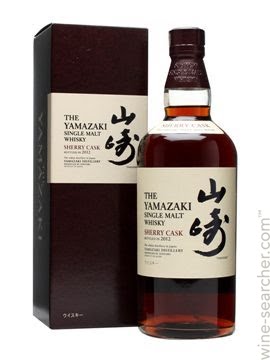Hearts broke all across Scotland this week when the 2015 Whiskey Bible made history by naming a Japanese whiskey as the world’s finest dram. This was especially painful for some, because not only does Scotland pride itself on being first in whiskey quality, and celebrate its thousand year old history of great whiskey, the product which beat their best this year is a Japanese scotch!
 More accurately, the liquor in question, Yamazaki Single Malt Sherry Cask 2013, is a Scottish style whiskey. Truth be told, most people I know, including scotch lovers like me, not only call it scotch and drink it like scotch, but think of it as real a scotch as the stuff produced in Scotland. That’s what really burns up many Scots and other purists.
More accurately, the liquor in question, Yamazaki Single Malt Sherry Cask 2013, is a Scottish style whiskey. Truth be told, most people I know, including scotch lovers like me, not only call it scotch and drink it like scotch, but think of it as real a scotch as the stuff produced in Scotland. That’s what really burns up many Scots and other purists.
Of course, this story is about more than scotch, as if that were not important enough! It’s about identity, authenticity and the fights which happen in every area of life when people argue about what’s really real and what is really not – whether it’s a drink, a food, a faith or politics.
What to do when an off-shore, late in the game version beats out the original? Is that a moment to call “rip off”, or cry “foul”, because an “imposter” product has stolen the show? I don’t think so, whether the product is a whiskey or most anything else – at least not necessarily.
Authenticity is a function of commitment to larger values and processes, not simply geographic or ideological purity.
I am actually quite comfortable calling Yamazaki an authentic scotch, just as I embrace calling authentic, forms of Judaism which depart from my understanding, and appreciate the American-ness of those who would take our nation in directions I may oppose. In each case, authenticity is a function of commitment to larger values and processes, not simply geographic or ideological purity.
Of course, definitions matter and I am not suggesting that simply slapping on a label should ever be confused with something being real or authentic. I am simply suggesting that if people go past the label and produce it with real connection to and respect for the “original”, and consumer/users experience the product as authentic, then it is, at least for them.
So as a scotch drinker who actually dreams of making a pilgrimage to the great distilleries of Scotland, I say this to broken-hearted Scots grumbling about being beaten by a “fake scotch”: take heart and hold your heads high! You created a magnificent tradition – one which has spread across the globe and one which is honored as sacred even thousands of miles from where it began. That’s about as real and authentic as anything gets.

Listed for many years in Newsweek as one of America’s “50 Most Influential Rabbis” and recognized as one of our nation’s leading “Preachers and Teachers,” by Beliefnet.com, Rabbi Brad Hirschfield serves as the President of Clal–The National Jewish Center for Learning and Leadership, a training institute, think tank, and resource center nurturing religious and intellectual pluralism within the Jewish community, and the wider world, preparing people to meet the biggest challenges we face in our increasingly polarized world.
An ordained Orthodox rabbi who studied for his PhD and taught at The Jewish Theological Seminary, he has also taught the University of Pennsylvania, where he directs an ongoing seminar, and American Jewish University. Rabbi Brad regularly teaches and consults for the US Army and United States Department of Defense, religious organizations — Jewish and Christian — including United Seminary (Methodist), Yeshivat Chovevei Torah (Modern Orthodox) Luther Seminary (Lutheran), and The Jewish Theological Seminary (Conservative) — civic organizations including No Labels, Odyssey Impact, and The Aspen Institute, numerous Jewish Federations, and a variety of communal and family foundations.
Hirschfield is the author and editor of numerous books, including You Don’t Have To Be Wrong For Me To Be Right: Finding Faith Without Fanaticism, writes a column for Religion News Service, and appears regularly on TV and radio in outlets ranging from The Washington Post to Fox News Channel. He is also the founder of the Stand and See Fellowship, which brings hundreds of Christian religious leaders to Israel, preparing them to address the increasing polarization around Middle East issues — and really all currently polarizing issues at home and abroad — with six words, “It’s more complicated than we know.”

